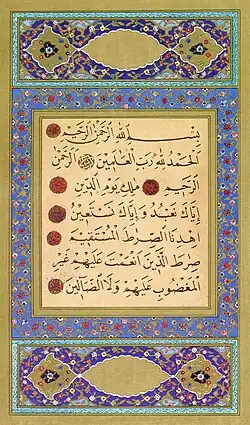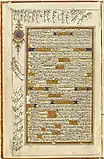| Author | Ahmad al-Tijani |
|---|---|
| Original title | Durood Fatih, Sholawat Fatih |
| Working title | صَلَاةُ الْفَاتِحِ |
| Country | Maghreb, Muslim world |
| Language | Arabic |
| Subject | Dhikr, Dua, Wird |
| Genre | Wazifa |
| Part of a series on Islam Sufism |
|---|
 |
|
|
| Part of a series on |
| Algerian Islamic reference |
|---|
  |
In Sufism, the Salat al-Fatih (Arabic: صَلَاةُ الْفَاتِحِ, "opener's prayer") is a regular litany (wird) and prayer for Muhammad practiced individually or in congregation by followers (murids) in the Tijaniyya order.[1][2]
Presentation
Salat al-Fatih is commonly known as Durood Fatih in the Indian subcontinent and Sholawat Fatih in Far East Asia.[3]
This litany was transmitted to Muslims by the Sheikh Muhammad ibn Abi al-Hasan al-Bakri, a descendant of Abu Bakr al-Siddiq.[4]
It is also attributed to Sheikh Ahmad al-Tijani, the founder of the Tijaniyya Sufi order, and this prayer is actually recited by millions of Tijaniyya adherents (murids) across the world as part of their daily wird.[5]
The full text and authentic formula of this litany and prayer for Muhammad is as follows:[6]
Arabic: اللَّهُمَّ صَلِّ عَلَى سَيِّدِنَا مُحَمَّدِ الْفَاتِحِ لِمَا أُغْلِقَ، وَالْخَاتِمِ لِمَا سَبَقَ، نَاصِرِ الْحَقِّ بِالْحَقِّ، الْهَادِي إِلَى صِرَاطِكَ الْمُسْتَقِيمِ، وَعَلَى آلِهِ حَقَّ قَدْرِهِ وَمِقْدَارِهِ الْعَظِيمِ.
English: O Allah, send prayers upon our master Muhammad, the opener of what was closed, and the seal of what had preceded, the helper of the truth by the Truth, and the guide to Your straight path. May Allah send prayers upon his Family according to his greatness and magnificent rank.
Practice
A condition for the good recitation of this prayer and that it must begin beforehand by offering four prayer units (rakaʿāt).[7]
The recitation (tilawa) of surah Al-Qadr will be performed in the first rakah, surah Al-Zalzalah in the second, surah Al-Kafirun in the third, and the two surates of seeking refuge (Surah Al-Falaq and Surah Al-Nas) in the fourth.[8]
After having completed the reading of this ritual prayer, the murid must burn a perfume of agarwood incense to perfume the room or the place of the recitation.[9]
Gallery
See also
References
- ↑ "Salatul Fatihi". www.tidjaniya.com. Retrieved 2021-03-28.
- ↑ David, Robinson; Jean-Louis, TRIAUD (2005-01-01). La Tijâniyya: Une confrérie musulmane à la conquête de l'Afrique (in French). KARTHALA Editions. ISBN 978-2-8111-2224-9.
- ↑ Studia Missionalia: Vol. 21 (in French). Gregorian Biblical BookShop.
- ↑ Brenner, Louis (1984-01-01). West African Sufi: The Religious Heritage and Spiritual Search of Cerno Bokar Saalif Taal. University of California Press. ISBN 978-0-520-05008-2.
- ↑ Seesemann, Rüdiger (2011). The Divine Flood: Ibrahim Niasse and the Roots of a Twentieth-century Sufi Revival. Oxford University Press. ISBN 978-0-19-538432-1.
- ↑ Adnani, Jillali El (2007). La Tijâniyya, 1781-1881: les origines d'une confrérie religieuse au Maghreb (in French). Marsam Editions. ISBN 978-9954-21-084-0.
- ↑ "Salatul Fatih | Durood Fatih | Sholawat Fatih - Prayer of the Opener". Dua Hub. Retrieved 2021-03-28.
- ↑ Tijani, Saeed (2017-10-23). "SALATUL FATIH: The Importance of Salatul Fatih". SALATUL FATIH. Retrieved 2021-03-28.
- ↑ "Validity of Salat-ul-Fatih-Invoking Allah's Blessings upon the Prophet". Validity of Salat-ul-Fatih-Invoking Allah's Blessings upon the Prophet. Retrieved 2021-03-28.
External links
- Explanation of Salat al-Fatih by the mufti Ali Gomaa on YouTube
- Text of Salat al-Fatih of the Tijaniyyah order on YouTube
- Benefits of Salat al-Fatih of the Tijaniyyah order on YouTube
- Salat al-Fatih of the Tijaniyyah order on YouTube
- Salat al-Fatih of the Tijaniyyah order on YouTube






